A Black-led Land Trust
Air Date: Week of June 28, 2024
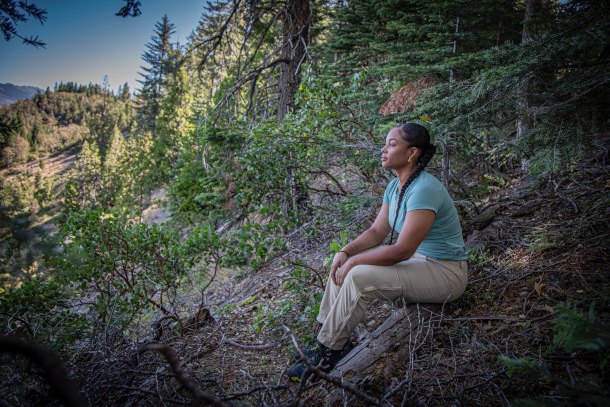
Jade Stevens says she wants to create a space where people of color feel safe and welcome so they can enjoy the outdoors. (Photo: K2J Productions)
The 40 Acre Conservation League is an African-American grounded land trust that seeks to ease access to the outdoors for people of color, who have historically been excluded from green spaces. The nonprofit recently purchased its first piece of land, 650 acres bordering the Tahoe National Forest in northern California. Jade Stevens is the president of the 40 Acre Conservation League and joined Host Steve Curwood to discuss her vision for the land and improving access to nature for Black and Brown folks.
Transcript
O’NEILL: It’s Living on Earth, I’m Aynsley O’Neill.
DOERING: And I’m Jenni Doering.
Green spaces tend to be harder to come by in communities of color, one of the many consequences of redlining, the racist practice of denying mortgages to Black families. And Black and Brown people often feel unsafe and unwelcome in wilderness and park areas dominated by white recreators. In a 2020 incident that went viral, a white woman called the police on a Black man who was birding in Central Park in New York City, sparking awareness about racism in outdoor spaces. Now, the first Black Land Trust in California, the 40 Acre Conservation League, is trying to right these wrongs. With $3 million in funding from the state Wildlife Conservation Board and Sierra Nevada Conservancy, the nonprofit recently purchased its first piece of land, 650 acres bordering the Tahoe National Forest in northern California. Jade Stevens is the President of the 40 Acre Conservation League, and she joined Living on Earth Host Steve Curwood.
CURWOOD: So before we talk about the project, let's talk a little bit about you and your own experiences. Tell me something that inspired you to start the 40 Acre Conservation League.
STEVENS: You know, I've always been in love with the outdoors. I have really great experiences as young as, I don't know, middle school, or even elementary school, as a Girl Scout, where I was able to do camping trips with my friends, hanging out on the beach, learning how to surf. And fast forward to now as an adult, my experience, similar to many, around 2020, during the pandemic, I found new activities to get me outside and just clear my head. And that was really cycling. And so being able to ride around some of the familiar trails and routes throughout California, I rode along PCH all the way to San Diego, I've gone up north to Santa Barbara and even rode around Northern California. And I realized that I didn't really see a lot of Black women like me cycling, and thought that if people were to join me and to see what I saw, they would really enjoy being outside. And so this ongoing love that I've had for the outdoors has been something that I've wanted to share with others. And so that is one of the things that really led me to starting the 40 Acre Conservation League.
CURWOOD: So talk to me about your experience and your concern as a Black woman about what it's like to be outdoors and how other Black people, other Black women, other people of color, have some trepidation about being outdoors.
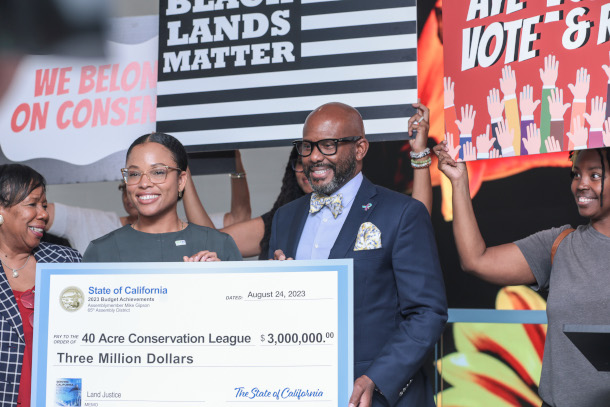
The 40 Acre Conservation League received $3 million in funding from California’s Wildlife Conservation Board and Sierra Nevada Conservancy to purchase their first property. Here, 40 Acre Conservation League president Jade Stevens (center left) and Assemblymember for California’s 65th Assembly District Mike Gipson (center right) pose with the ceremonial check. (Photo: K2J Productions)
STEVENS: Yeah, as much as I love cycling, and where it's taken me, I've definitely ended up in areas where I didn't feel exactly welcomed or safe. And one thing as a cyclist that we all have to remember is when you're on your bike, you're really on your own, right? You have your phone to call someone, but there are certain areas where there just isn't a strong connection. And so I've definitely been in areas within the mountain where there was really no one there but me and you know, thinking about who can I call on who would you know, be willing to open their door, right, if I were to end up in a flat or if I actually injured myself. And I do remember a personal experience riding through the Trump caravans and being blocked off from getting through the road because they didn't want us throwing off their rally, right? I will say that I definitely felt uncomfortable, just kind of hearing people say like, we don't want you here, or get out of the way. I think that was a wake up call for me. And so those are experiences that could have turned out more dangerous, but it only takes one story, one experience to really deter others from wanting to try those things out. And I encourage people to be aware of those things. But I hope that through the work that we're doing, they'll still feel comfortable to do it together with people that look like them.
CURWOOD: Let's talk a little bit about the history behind the name that you've picked, the 40 Acre Conservation League. Of course, famously, during the Civil War, General Sherman as he was marching through had many Black people attached to his column, because if you joined up with the Union Army, you were free if you were a slave. And finally, I think he turned around and said, look, you don't have to stick with me, we'll get you 40 acres and a mule. Of course, as we know, that never really happened for most, or certainly a whole lot of Black people. How does General Sherman's promise, the failure to meet that promise, connect with your organization's present mission?
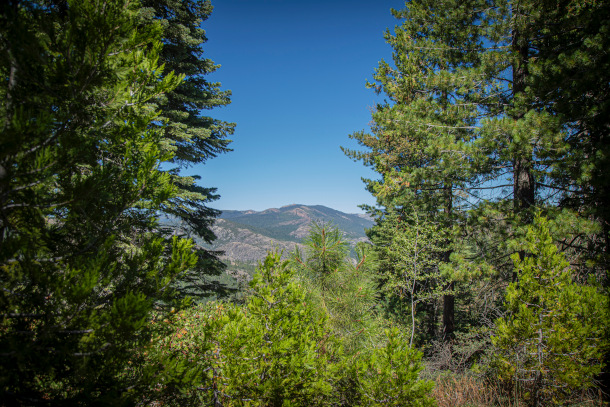
The 650-acre property borders Tahoe National Forest and is home to plenty of wildlife. (Photo: KJ2 Productions)
STEVENS: Right, yeah, 40 Acre Conservation League was inspired by that unfulfilled promise of 40 acres and a mule. And, you know, the damage from that moment, right, has been equivalent to almost $326 billion in Black land loss. From that moment of an unfulfilled promise of getting land, the Black community has really suffered from that. And so rather than dwell on something that was promised to us, the idea of the 40 Acre Conservation League was really meant to inspire a new way of thinking about it. And so we know that land ownership is one of the key factors that really pushes generational wealth. And so with that, we thought, if we were able to acquire land, and really remove that as being a, you know, true barrier from achieving economic success, we would want to do that, to really help think about how we can change that outcome of the unfulfilled promise. And we're really focused on finding ways to use this as a catalyst to get more people into the conservation space and really the outdoor industry and really tap into the opportunities that lay there.
CURWOOD: And now you've purchased your first piece of land in California with funding from organizations like the Wildlife Conservation Board, the Sierra Nevada Conservancy. So for a moment, take me with your words to this land. Where is it exactly and what does it look like?
STEVENS: Right, so this land is located in an area called Emigrant Gap. It is the midway point between Sacramento and Lake Tahoe. And the first thing you would see when you get to the property is Lake Putt. It is a 30 acre lake that is beautiful and is really one of my favorite places to kind of sit down and reflect. Outside of the lake, there is miles of trails that you can walk and explore around the different mountainscapes and trees. And if you're feeling like taking a hike, there's a creek that you can follow from the lake that goes for a couple more miles deeper into the property. If you're familiar with Lake Tahoe, and the Tahoe National Forest, that is one of the major borders around our property. And it's really just a beautiful place.
CURWOOD: But I mean, I have to ask you this. I mean, that territory tends to have mountain lions as well. I mean, how safe is it to hike in there?
STEVENS: No, you're right. There's definitely mountain lions there. I remember the first time I went there, I did see a couple of footprints from what I'm sure were mountain lions. But in addition to that, there are deer, bumblebees, butterflies. So I mean, yes, you are in their home. And I understand that that might be a little concerning for those that are just dying to visit the property. But I do think with proper education and just increasing everyone's eco literacy, they'll have a better understanding on how we can both enjoy the property without any sense of risk.
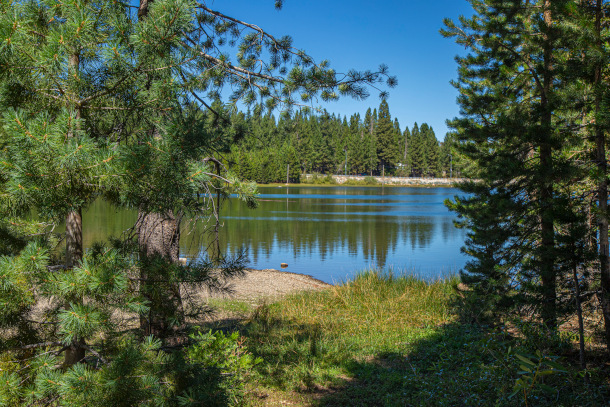
The property includes 30-acre Lake Putt, along with miles of mountainscapes and forests. (Photo: K2J Productions)
CURWOOD: So what's your vision for this land moving forward, Jade? How do you plan to bring the 40 Acre Conservation League's mission to life there, next to the Tahoe National Forest?
STEVENS: Right, so the work that we do, our mission and vision is to achieve an outdoor for all, where everyone can feel safe and welcomed to nature. And we see this happening in three ways, which is really the pillar of our work: through economic justice, environmental justice, and recreational justice. So starting with recreational justice, this is really something that we believe is possible for everyone. We want people to be able to enjoy the outdoors in a way that is accommodating and safe and publicly accessible to everyone. If we can achieve that, then we're increasing the connection and appreciation for the outdoors, which helps us to achieve the second pillar, which is environmental justice, helping people understand the importance of conserving land and why it's so important to protect this. And then once people appreciate how important it is to enjoy it, for those that have entrepreneurial views, that helps us hit our third pillar, which is economic justice. That outdoor economy is $97 billion. But it is not diverse. The number of registered foresters, ecologists, scientists is less than 1% across the board when we're talking about people of color, and so being able to not only enjoy it, and understand how to protect it, but finding a way to really benefit from it as an entrepreneur is something that we believe can all exist in the conservation space. And that is the vision that we have with all of the land we acquire.
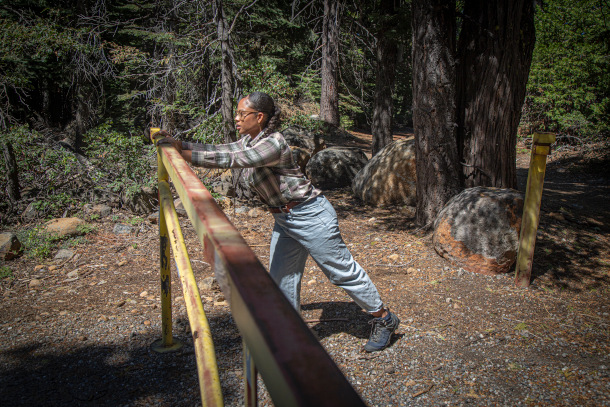
Jade Stevens pushes open the gate of the new property. (Photo: K2J Productions)
CURWOOD: So the richness of the land, from the land, and what about for the land? How do you plan to make sure that the ecology of this place stays intact, it doesn't perhaps get loved to death, which can happen in some public spaces?
STEVENS: Right, yeah, I think we rely not only on the work that we're doing right now with the land, but relying on our partners to increase eco literacy and have more educational programming for the everyday person to understand what it means to conserve land. And so 650 Acres is a huge space, and there will be certain areas that people will be able to recreate at, but most of it will be left untouched, right? There's a balance between having areas that are designated for camping, fishing, hiking, while also having other areas that are protected based on the habitat that's there.
CURWOOD: California is a risky place for wildfires. How do you plan to deal with that threat in the coming years and decades as climate change continues to get worse? It's getting hotter and hotter.
STEVENS: Yes, climate change is something that we are actively following. When we chose this land, we knew that it was in a wildfire risk zone and those across the country know California is synonymously associated with wildfires. And so we received funding to do two things: one, which is public access planning, and the larger part is forest health and restoration. And that is a huge part that can help us respond to wildfire risks. And so our job now is to identify areas that have an overgrowth of shrub or an overgrowth of fuel that could really give way to a spread of wildfire and clearing that out. So that work is already underway. It's something that will be continuous, where we are identifying sections within the property that needs to be restored and removed. And that's something that we're constantly seeking funding for to continue the work to do our part in reducing the chances of wildfire in that area.
CURWOOD: So what do you hear from people of color about your project and how they experience the outdoors? How crucial do they see a space like this being?
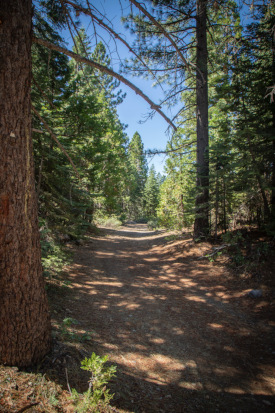
Jade says the property will provide some spaces where people can recreate, while other areas will remain untouched for conservation. (Photo: K2J Productions)
STEVENS: You know, you just took me back to a letter that we received when we announced the acquisition of our first land. And it came from an inmate at San Quentin prison. And he wrote us a letter after watching a news segment that we acquired this land. And I'm not gonna lie, I got a little emotional, because I was not expecting that. But his letter was just filled with gratitude that he was inspired, even though that he was in a cell, that he was inspired, that when he would be released, that he would have a place to go to. Growing up in LA, seeing people that have never, you know, left their block, he now is looking forward to the opportunity to go to a place that he feels welcome. And so there's so many opinions, and I've said them myself, you know, not feeling comfortable, are there mountain lions there, but then on the other side, we're hearing such great feedback from more people saying that, because we saw you there, I can't wait to go on the first tour. And so that's really inspiring and motivating for us that being able to just plant the idea into the community that you know, we belong, is something that we want to continue and really start a movement.
CURWOOD: So Jade, this is just your first piece of land that you have helped acquire for the public of color. What are you hoping the 40 Acre Conservation League will accomplish in the next, I don't know, 10, 20, 30, 40, 100 years?
STEVENS: Our goal after this first land acquisition is to continue to acquire more land in different terrains. We have a formula that really guides the property we go after. And because we are really trying to connect the community to the outdoors, we tend to look for land that is between 100 or 150 miles away from an urban area. So Sacramento is a good example, Emigrant Gap is about 70 miles from the city. And so we are actively looking for other land opportunities in the Bay area, near Los Angeles, near San Diego. And since you said 10, 20, 30 years, eventually across the country, and knowing that different terrains, from the forest to the beach, even to the desert, are different experiences that people are ready to explore. And so that is something that we hope to continue doing, as we continue on this work.
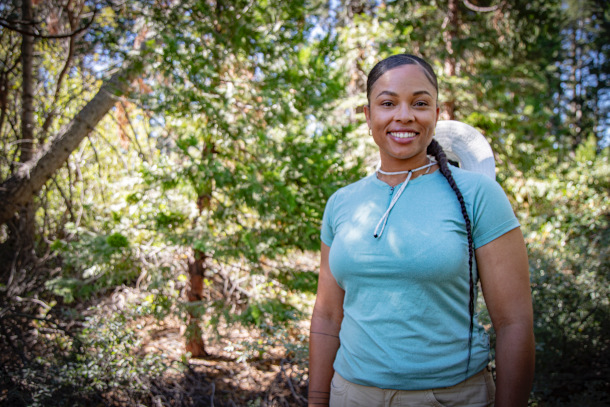
Jade Stevens is the president of the 40 Acre Conservation League. (Photo: K2J Productions)
CURWOOD: Jade, take me back to the moment when you realized that you wanted to have open space for people of color, and that you were the one that could somehow make that, or at least help make that happen?
STEVENS: Right. Again, you're taking me back to these great memories when I got the key to the gate that opens for the property. And we had many moments, from the board approving us for the funding and having visited the land already from the previous owners, but having the opportunity to just walk up and open the gate as if it was my house and opening the door and walking there for the first time, it kind of like made me breathless for a second, where I really held the key to allow the community to come onto this land with me. And so it was so memorable, but also really symbolized exactly what you said, that I now have the responsibility to really do my part in building this connection with nature and really improving the relationship for people of color with nature. And so it's something that I don't take lightly. It's something that makes me excited because I personally love the outdoors. And I just can't wait to share this with everyone.
DOERING: That’s Jade Stevens, President of the 40 Acre Conservation League, speaking with Living on Earth Host Steve Curwood.
Links
Living on Earth wants to hear from you!
Living on Earth
62 Calef Highway, Suite 212
Lee, NH 03861
Telephone: 617-287-4121
E-mail: comments@loe.org
Newsletter [Click here]
Donate to Living on Earth!
Living on Earth is an independent media program and relies entirely on contributions from listeners and institutions supporting public service. Please donate now to preserve an independent environmental voice.
NewsletterLiving on Earth offers a weekly delivery of the show's rundown to your mailbox. Sign up for our newsletter today!
 Sailors For The Sea: Be the change you want to sea.
Sailors For The Sea: Be the change you want to sea.
 The Grantham Foundation for the Protection of the Environment: Committed to protecting and improving the health of the global environment.
The Grantham Foundation for the Protection of the Environment: Committed to protecting and improving the health of the global environment.
 Contribute to Living on Earth and receive, as our gift to you, an archival print of one of Mark Seth Lender's extraordinary wildlife photographs. Follow the link to see Mark's current collection of photographs.
Contribute to Living on Earth and receive, as our gift to you, an archival print of one of Mark Seth Lender's extraordinary wildlife photographs. Follow the link to see Mark's current collection of photographs.
 Buy a signed copy of Mark Seth Lender's book Smeagull the Seagull & support Living on Earth
Buy a signed copy of Mark Seth Lender's book Smeagull the Seagull & support Living on Earth

